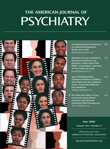In this issue of the
Journal, Pinkham et al. report findings on own-race and other-race effects in their research on facial recognition in schizophrenia
(1) . They highlight the troubling finding in previous studies that African Americans with schizophrenia had greater impairment in recognizing and remembering emotions in faces, compared with Caucasian schizophrenia patients. The authors point out that these previous studies showed only Caucasian faces as test stimuli—a major procedural flaw that no one had anticipated. Pinkham et al. designed a better study in which test subjects—both Caucasians and African Americans with schizophrenia as well as comparison subjects of both races—were shown both Caucasian and African American faces as test stimuli. The authors found that the capacity to recognize and remember emotions in faces is no different between Caucasians and African Americans, whether they have schizophrenia or not. But memory for the faces and discrimination of emotions in them are higher when the study subject is of the same race as the person expressing the facial emotion.
As did the mental health report on culture, race, and ethnicity from former Surgeon General David Satcher
(2), this study underscores the unfortunate reality that “monocultural ethnocentrism” continues to pervade “good science” in psychiatric research. Pinkham et al. have respectfully added to the literature on “special populations”
(3) . Their study highlights how culture, race, and ethnicity influence research findings. Indeed, it is quite disappointing to realize that many other studies in the 21st century continue to overlook the need to norm measures across different populations and the need for diversity of culture, race, and ethnicity in procedures using stimuli to elicit responses measured by psychological or neuropsychiatric tools.
Because of historical stereotypes of African Americans, we are wary of psychiatric research and treatment
(4) . “Race constitutes a stubbornly resistant malady in the United States because of ‘the color line’—a visible (and invisible) barrier that separates whites from nonwhites” (
5, p. 3). Pinkham and colleagues’ study is extremely important because it is a paradigmatic example, for all races, of the proper way to consider cultural, racial, and ethnic variables to increase the validity of a scientific study.
Aside from the important scientific information Pinkham et al. have elicited, for me this study’s greatest contribution to the literature is in showing why, despite legitimate reasons for being suspicious of research, African Americans need to volunteer to participate in research studies and why scientists need to diversify the culture, race, and ethnicity of their research subjects. Until researchers learn to correct the problems emphasized in Guthrie’s book
Even the Rat Was White (6), our science will be lacking. Basic science tells us that in ecotones, that is, where different ecological zones overlap and are rich in diversity, there is an enhanced capacity for learning, growth, and creativity. Let us apply that basic observation to psychiatry and profit from recognizing diversity in scientific measures and methodologies, as this study illustrates.
The results of the Pinkham et al. study will likely be extrapolated beyond psychological testing. For example, lawyers use witnesses to identify perpetrators of crimes, and psychiatrists use assessment of emotional expression in faces as a part of their mental status examination. Pinkham et al. found that African Americans are more accurate in immediate face memory for members of their own race, although there was no such difference for Caucasians. Nevertheless, healthy comparison Caucasians were less accurate in delayed face memory for African American faces compared with Caucasian faces, and healthy comparison African Americans were less accurate in delayed face memory of Caucasian faces compared with African American faces. These results could be raised in a court of law when the culture, race, or ethnicity of a witness differs from that of an alleged criminal offender. Similarly, emotional recognition of African American faces was greater among Caucasians and African Americans (schizophrenia patient or not), but emotional recognition of Caucasian faces among African Americans was less accurate. Thus, the question of accuracy in determining affect in a mental status examination when the culture, race, or ethnicity of examiner and patient are different or alike is another issue that this article subtly raises.
However, in the majority of tasks—immediate face memory, delayed face memory, and emotional recognition—more than 70% of the study subjects correctly identified the stimulus. Thus, we are more likely to be right than wrong when performing these tasks.
Jones et al.
(7) pointed out that compared with black psychiatrists, white psychiatrists seem to have limited experience in treating black patients. Thus, it is clearly important that we continue to tease out legitimate cultural, racial, and ethnic differences in science’s efforts to understand the complexity of assessing and treating diverse populations. Clearly, in order to accomplish this task we need diversity in scientific panels reviewing grants proposals and on editorial boards. Otherwise, it is doubtful that these sensitive issues will ever be adequately addressed.

